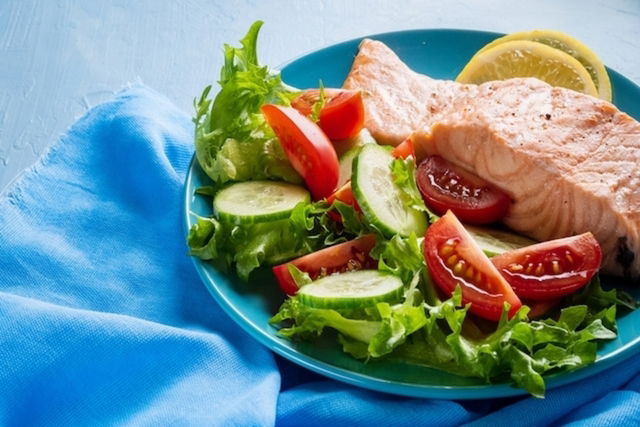An IBS diet should be easy to digest and should not include foods that stimulate the gastrointestinal mucosa. Foods to avoid include coffee, spicy food, and high fat or sugar foods. Fiber should be consumed on a regular basis.
IBS diets vary from person to person, as tolerance and certain symptoms can vary. Some patients may report alternating periods of constipation and diarrhea with bloating. Therefore, you should consult a registered dietitian for assessment and a more customized meal plan.
In addition, it is also recommended to track what you eat and at what time, as this can help to identify the exact foods that trigger symptoms like diarrhea, excess gas and constipation.

What to eat
The food that can help to prevent flare-ups and should be included in your diet are:
- Fruits like papaya, melon, strawberries, lemon, tangerines, oranges and grapes
- White or orange vegetables like cabbage, carrots, pumpkin, squash, cucumber and lettuce
- White meat like chicken and turkey
- Fish of any type, but grilled, baked in the oven, or steamed
- Probiotic foods like yogurt and kefir
- Eggs
- Skim milk and white cheeses without lactose (although if you have discomfort after consuming dairy products, you should avoid them altogether)
- Vegetable-based milk like almond milk, oat milk and coconut milk
- Nuts like almonds, walnuts, peanuts, chestnuts and pistachios
- Teas with digestive and soothing properties, like chamomile, linden, and lemon balm (ideally unsweetened)
- Non-wheat flours, like oat flour, almond flour and coconut flour to make bread, cakes and other desserts
- Quinoa and buckwheat
In addition, you should aim to consume 1.5 to 3 L of fluids per day, which can be consumed as water, soups, smoothies and teas. This helps to keep the stool hydrated for easier bowel movements, as well as to prevent dehydration in times of diarrhea.
It is also important to mention that the foods that are permitted in an IBS diet may vary from person to person, as patients with IBS can additionally have a gluten intolerance, gluten allergy, lactose intolerance or sensitivity to another food.
Other food recommendations
To relieve discomfort from IBS symptoms, it is important to eat small meals several times per day. You should chew your food carefully, avoid skipping meals and exercise regularly to promote good bowel movements.
In addition, you should limit your fruit intake to 3 portions per day and vegetables to 2 portions per day. Tough fibers that are hard on the digestive system should also be avoided, as they tend to ferment for longer in the gut and lead to increased gas production.
Foods should generally be cooked simply with little added sauces. Food can be seasoned with aromatic herbs instead.
What to eat in moderation
Food that is rich in fiber should be eaten in moderation, although this can vary from person to person depending on their symptoms and tolerance for fiber.
There are 2 types of fiber: soluble and insoluble. Most vegetables contain a combination of both, although some will have a higher ratio of one or the other. Patients with IBS are advised to opt for soluble fiber, as these tend to produce less gas.
For this reason, the following foods can be eaten, but in moderation:
- Grains: like rye, whole wheat rice, corn, oats and whole wheat pasta
- Green bananas
- Legumes like lentils, beans, chickpeas, asparagus and peas
- Vegetables like brussel sprouts, onion and garlic
This type of fiber is beneficial for people who have constipation, although it should not be consumed excessively. People with diarrhea should avoid eating these types of food.
What to avoid
To maintain an IBS diet, it is important to avoid stimulating foods like coffee, chocolate, energy drinks, black tea and green tea You should also avoid alcohol and foods with artificial coloring.
Foods to avoid include:
- Spices (like pepper), chicken broth and sauces
- High fat foods and high sugar foods, like fried food
- Sausages and fatty red meat
- Yellow cheeses
- Frozen meals, like nuggets, pizza and lasagna
These foods tend to cause more inflammation and irritate the intestinal lining. This can trigger or worsen symptoms, like diarrhea, constipation, gas, cramps and abdominal pain.
3-day meal plan
The following table outlines a sample 3-day meal plan to manage IBS symptoms:
The quantities and types of food indicated can vary, as IBS presents differently in each person. Therefore, you should consult a registered dietitian to formulate a meal plan that is based on your individual needs and trigger foods.
What is a FODMAP diet?
To have a better idea of which foods to avoid, your doctor or registered dietitian may recommend a FODMAP diet. This diet classifies food into various groups - fructose, lactose, oligosaccharides and polyols.
These foods are less absorbed in the small intestine and are rapidly fermented by gut bacteria. When they are reduced or avoided, symptoms of IBS tend to improve.
Initially, these foods should be avoided for 6 to 8 weeks. They are then reintroduced into the diet.
